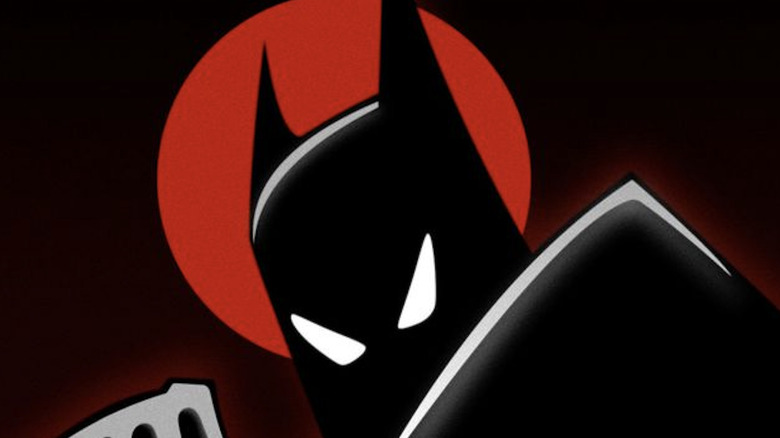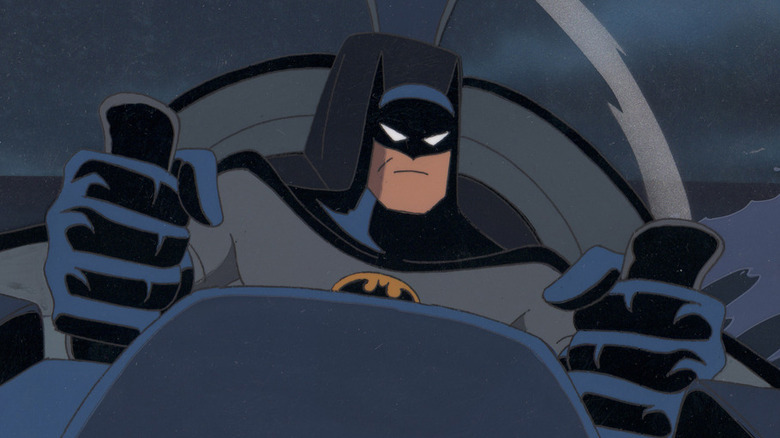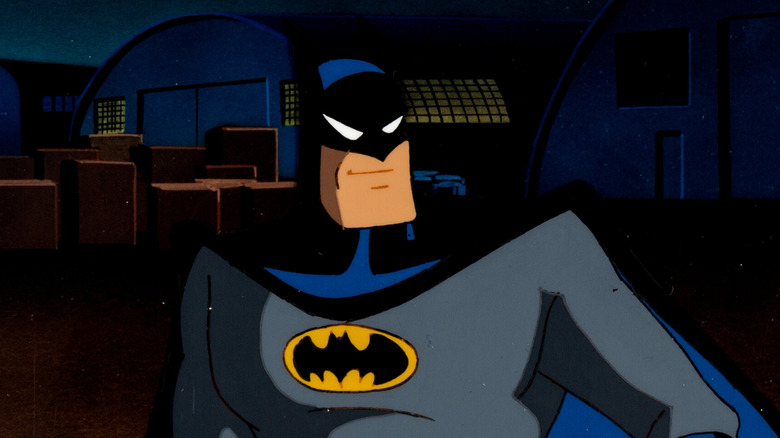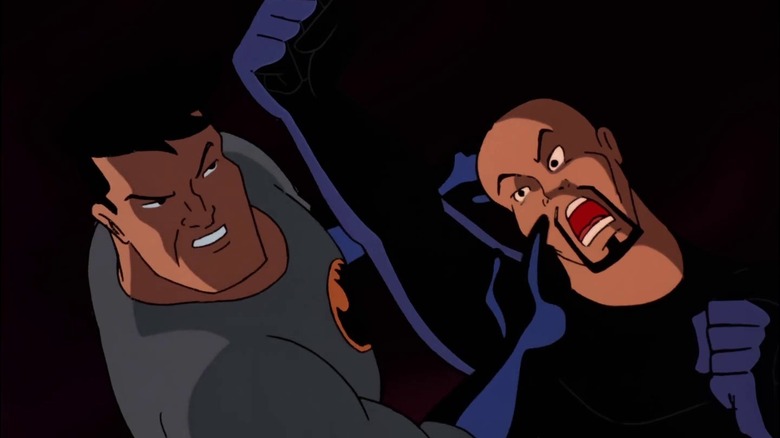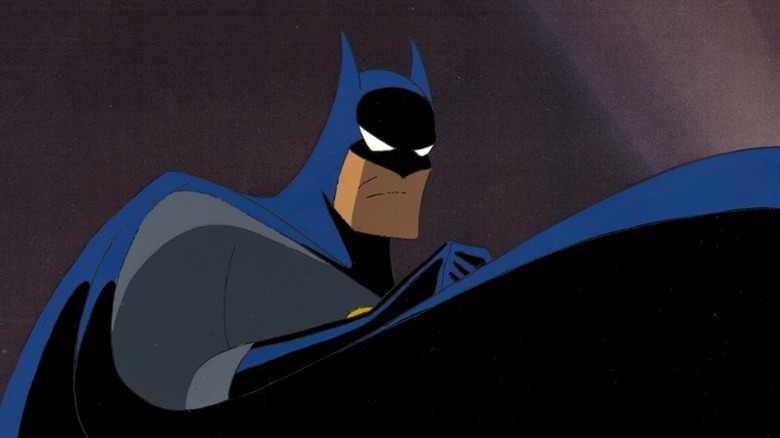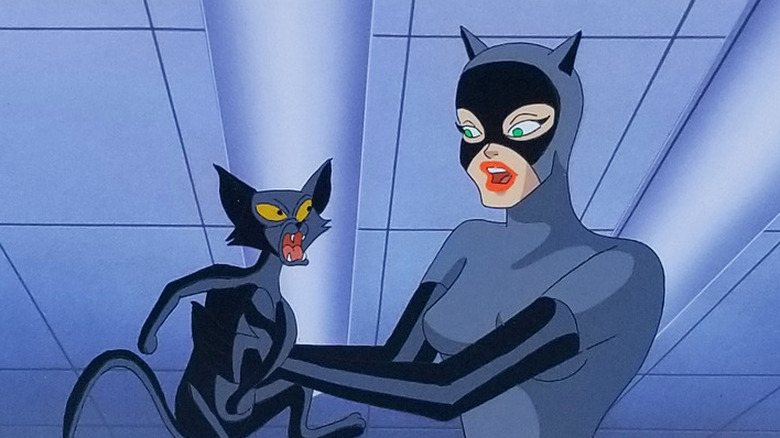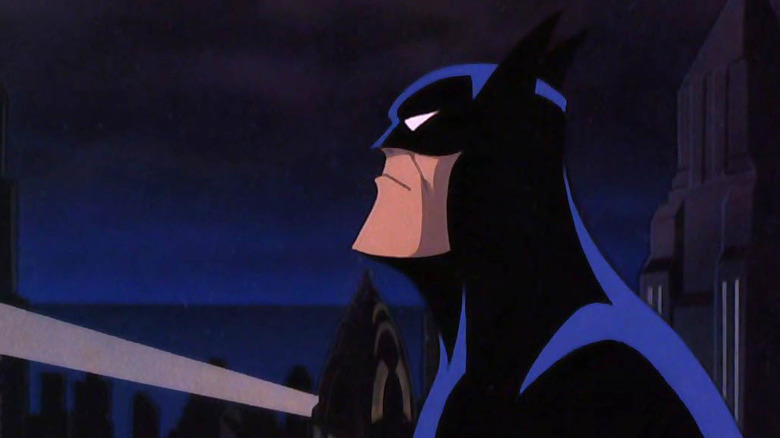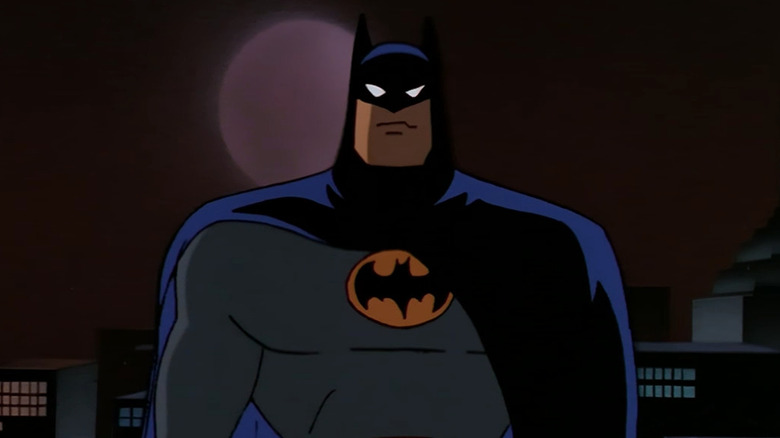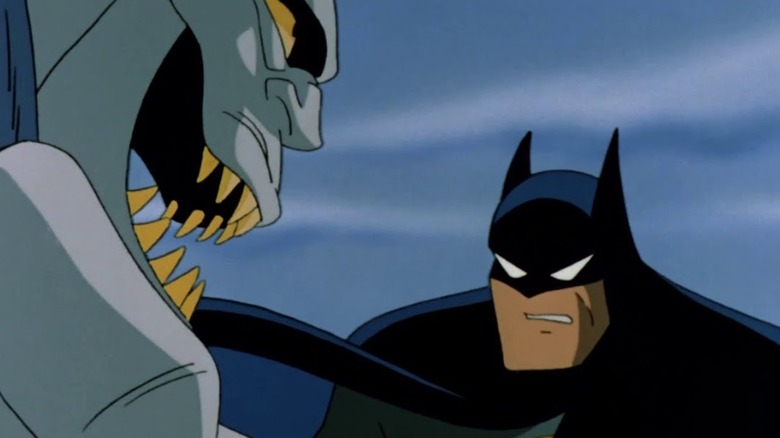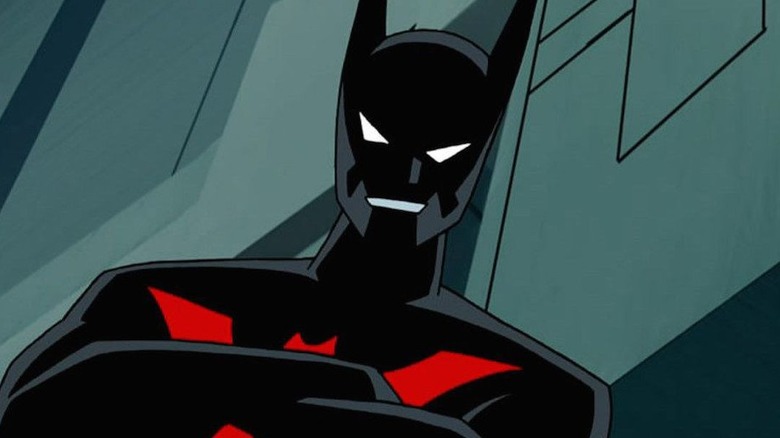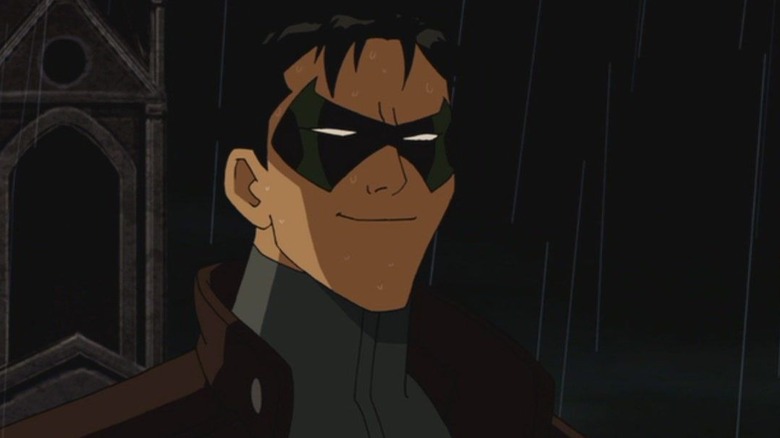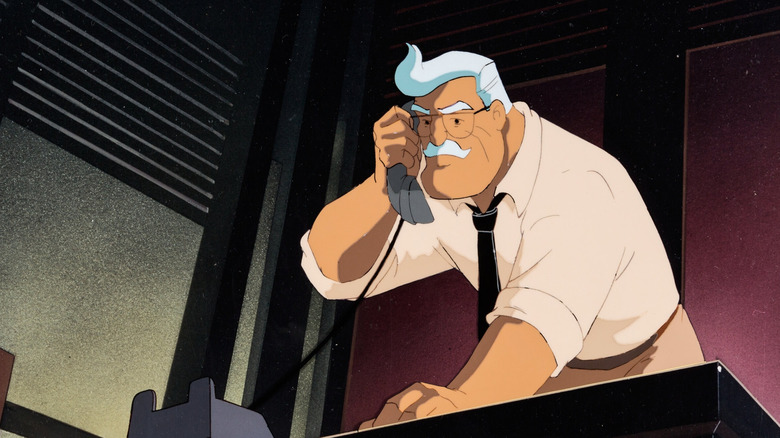Things We Want To Hear In The Batman: The Animated Series Audio Drama
"Batman: The Animated Series" ranks among the most influential animated adaptions of a comic book character ever produced, having elevated the medium from 1992 – 1995 with high quality stories, mature themes, top-notch visuals, Hollywood-level voice acting, and a memorable cinematic score. Decades later, it remains an enduring part of Batman's legacy — as evidenced by Kevin Conroy and Mark Hamill, who made their debuts in the series as Batman and the Joker and continue to voice those same roles in other Batman projects including live action and video games — and is fondly remembered by fans all over the world.
In celebration of the show's 30th anniversary, a new revival of the classic animated series is on its way, but not on the small screen. Instead, series producer Alan Burnett — who also contributed 11 stories to the original series — and voice actors Conroy and John Glover (who played the Riddler) jointly announced at the recent Los Angeles Comic Con that they would be taking part in an all new audio drama continuing the adventures of Batman from the original animated series.
Beyond Batman and The Riddler, there's very little else that fans know about the upcoming audio drama series. What sort of new stories might we see? Which returning characters or new villains could we encounter in these audio adventures? Here are some ideas for what fans would like to see in the "Batman: The Animated Series" audio drama.
A trip back in time
The audio drama won't be the first time WB has returned to the world of "Batman: The Animated Series" since its conclusion; "The New Batman Adventures" debuted in 1997 and jumped forward a number of years, as the quasi-sequel series depicted a new Robin and a more experienced Batman. Later still, a pair of "Justice League" series kept Batman's story going even further. More recently, the animated film "Batman and Robin: Harley Quinn" revisited the series once again in 2017, with a veteran Batman and Nightwing at his side.
For the audio drama, why not go back in time and revisit Batman's roots? It would be fascinating to hear what Batman was up to between the events of "Batman: The Animated Series" and "The New Batman Adventures." It was in some ways a more exciting time: a less experienced Dark Knight, a less colorful Gotham City, and a smaller world with few other superheroes. He had less gadgets, less powerful tech, and in earlier episodes was not the unbeatable crime fighter he has since become, which might make for more interesting stories than the version of Batman depicted in later shows. It would also be a time when Batman's embittered sidekick had left him (as seen in the flashback episode "Old Wounds"), and could explore how Bruce Wayne adjusted to being a solo adventurer again.
A return to solo adventuring
In the middle of the first season of "Batman: The Animated Series," viewers were introduced to Bruce Wayne's ward Dick Grayson and his superhero sidekick alter ego Robin. It's one of the most famous pairings in pop culture and was a highlight of the series, but by the second season nearly every episode saw the dynamic duo fighting crime side by side. In "The New Batman Adventures" they added Batgirl to the team full time, and in the two "Justice League" series' Batman fought alongside dozens of other heroes. It's been nearly three decades since this version of Batman has been shown flying solo, on his own fighting villains in Gotham City. While everybody loves Batman's "bat-family," it's high time the Dark Knight got back to being a loner, fighting a one-man war on the criminal underworld.
It might be tough given audio limitations, because not being able to see what he's doing, having a sidekick makes it easier to verbalize what's happening. But with some clever writing and strong monologuing, there's little reason Batman can't return to solo crimefighting. This would surely make for a more tension-filled set of stories, as Batman would have to rely solely on his own wits and fortitude.
Bring back lesser villains
Not all episodes of "Batman: The Animated Series" saw the caped crusader facing off against the biggest, best-known villains like the Joker, the Penguin, the Riddler, or Two-Face. Many lesser known villains got the spotlight too, and while some were indeed forgettable (if we never see Boss Biggis or the Sewer King again it'll be too soon), it would be nice to see series writer Alan Burnett dip his toe back into that well again. Several original or lesser-known villains were well done, fascinating characters in their own right, and it would be interesting to see them resolve dangling plot threads from the original series.
One way to do that would be to bring back the likes of Kyodai Ken, Bruce Wayne's ninja nemesis who popped up in a pair of original series episodes, but whose fate was never made entirely clear in his final appearance. Similarly, the whereabouts of the villain Red Klaw, a terrorist glimpsed in the series premiere (and who returned for a follow-up in an admittedly lackluster late series entry), was left up in the air. To have her return, with Kate Mulgrew back in the role, would make for a compelling guest star and a nice follow-up on a lesser-known, established villain. Bringing back characters created just for the 1992 series would also be a fun way to harken back to the audio drama's animated origins.
New characters
After decades of new Batman comics, there are countless new stories to pull from or adapt. From Batman replacement Azrael, to Bruce Wayne's son and current Robin Damian Wayne, to several new Batgirls, and new villains like Knightfall and Merrymaker, there are any number of more recent stories and new characters that could be introduced into the new audio drama.
If fans want to see their old favorites (or new versions) of Batman's comic book rogue's gallery, entirely new characters are a must as well. Some might cringe at the thought of Burnett and company fashioning entirely new characters when the comics have such a wealth of incredible heroes and villains to mine, but never forget that the creators of the original series were responsible for the existence of characters like Harley Quinn, Renee Montoya, and Roland Daggett, all characters who would make there way into comic books and movies like "The Suicide Squad," "Batwoman," and "The Dark Knight Rises." With original series writer Burnett involved as series producer, new characters have the potential to be compelling and long-lived.
Kid friendly stories
Given that the original audience for "Batman: The Animated Series" was probably around 10 to 12 years old in 1992 when it first premiered, it may be tempting for producers to gear their new stories towards that audience, now in their 40s. Aging up the already mature themed series to a much more adult-skewing one might make for some compelling audio episodes, but it might take the drama too far from its roots as children's afternoon programming. While fans today look back and often remember only the darker, more somber stories, "Batman: the Animated Series" also had a healthy dose of good humor and lighter fare too, and that mix of styles should be retained in the audio drama.
It's also important for the new series to stay appropriate for kids, because it could very well be the first introduction for younger audiences into the wonderful world of audio adventures. Conversely, these new stories could also be someone's first exposure to the "Batman: Animated Series" universe, and help them discover the older animated series. Keeping the stories fun and kid-friendly could be crucial to recapturing the vibe of the original series episodes. Sprinkling in some offbeat humor and some light-hearted voice performances from its cast would go a long way towards ensuring it feels at home among the early run of animated episodes from Burnett, Dini, and Timm.
The struggle to be Batman
On the opposite end of the spectrum, "Batman: The Animated Series" was famous for having some pretty heavy themes, especially for a kids show in the early 1990s. It addressed real social issues, darker stories, and the impact of big city crime. Kids found it action-packed and entertaining, while teenage and adult audiences could appreciate the serious plots and compelling characters facing real issues. The best stories had a true emotional core that carried real weight with audiences.
But one theme seemed to rise above the rest, playing a key role in some of the best episodes of the series. That's why there needs to be more stories that express Bruce Wayne's existential struggle as the Dark Knight, questioning his role as a crime fighter, and what it means to be Batman. From the classic episodes "I Am The Night" and "Appointment in Crime Alley," right up to one of the highest rated episodes of the entire series, "Trial," it's a theme that popped up again and again, but was lost when the series transitioned to more colorful adventures in subsequent iterations. A return to these kinds of introspective stories could help return the spirit of the original series in the audio drama.
Social justice Batman
Nobody wants Batman to become a political mouthpiece, but there's no denying social issues of today have an even greater possible relevance than they did thirty years ago, considering issues of police ethics, government corruption, LGBTQ rights and racism (many touched upon in at least some way in the original cartoon) have only been amplified. In an audio adaptation of "Batman: The Animated Series," the possibilities seem ripe for exploration.
It has already been mentioned by Riddler actor John Glover that his villainous character could perhaps acknowledge a more modern medical diagnosis. "The Riddler's back, and he's evolved in many ways," Glover said in 2021 at a Los Angeles Comic Con panel. "He understands he's on the spectrum." So, it's clear that a contemporary attitude around the stories for the audio drama is taking shape. Taking things one step further, the stories addressing relevant cultural and social attitudes could very well be an important aspect of the upcoming revival.
Keep it classic
One of the strengths of "Batman: the Animated Series" was how it combined and simplified the complex Batman mythos, distilling it both in story and visuals. Even the more modern villain, Bane, was reimagined as a steroid-pumping mafia enforcer, his extreme '90s look streamlined into something that fit the classic look and feel of the animated series. Likewise, the audio drama should do the same, keeping complex stories simple, fast-paced, and nimble. There's no need for complicated mysteries, deep mythologies, or complex backstories to new or returning characters, as one of the series' best attributes was how it cut out the fat and got right to the heart of the story, quickly and efficiently.
The series should also retain its timeless quality, as one hallmark of the original series was its nebulous, unquantifiable setting, with computers next to black and white televisions, 1940's cars driven by goons with 1990s beepers. New stories should continue that trend, resisting any temptation to bring the show too far into the 21st century. Keep it simple, keep it classic.
A transition to the future
If producers do choose to move the story forward past "Justice League," it would be very entertaining to witness a steady transition into the futuristic world of "Batman Beyond." That series had an elderly Bruce Wayne training young Terry McGinnis to take up the mantle of Batman, in a show with a rich and realized world, featuring Barbara Gordon as the city's police commissioner, Wayne Enterprise merged with Powers Technologies, and the streets run by the Jokerz Gang.
If the series is set some years past the last events of "Batman and Harley Quinn," there could be an evolution towards "Beyond," with Barbara Gordon now a lieutenant in the Gotham Police Department and on her way up the ranks towards commissioner. They could also set the stage for the future of "Batman Beyond" by introducing Derek Powers as a young, hotshot Silicon Valley-type tech genius at Wayne Enterprises who leaves the company to launch his own firm. Not only would these be good stories in their own right — and fun Easter eggs for fans — but it could even help lay the groundwork for a potential "Batman Beyond" revival.
Jason Todd
Even though "Batman: The Animated Series" and its follow-up "The New Batman Adventures" ran for only three seasons, it covered a lot of ground, from his origin to the then-recently introduced villain called Bane. Viewers met Dick Grayson (witnessing his evolution from orphan to Robin to Nightwing), Barbara Gordon (who went from Batgirl, part time vigilante to Batgirl, full time Batman team member) to Penguin (going from supervillain to legitimate businessman and owner of an upstanding Gotham nightclub) to Batwoman (in a follow-up direct-to-DVD feature). The series ran through decades of stories in Batman's universe in impressive time.
But one member of the bat-family conspicuously absent was Jason Todd, the angry, bitter street punk who would become Batman's second Robin in the comics, only to be killed by the Joker. Elements from his stories did make their way into the animated series, with Tim Drake's cartoon origin and eventual fate sharing some commonalities, but Jason Todd himself was never glimpsed. If an audio drama series were to delve into the period of time after Grayson left Batman's side and before the arrival of Tim Drake, introducing Jason Todd as the "missing" Robin feels like a must.
Homages to lost heroes
One of the ways "Batman: The Animated Series" distinguished itself from the competition was emphasizing supporting characters. From Bruce Wayne's butler Alfred to Detective Bullock, Mayor Hill, Commissioner Gordon, or Dr. Leslie Thompkins, the show gave substantial moments to surrounding characters that helped Gotham become a fully realized, rich city with depth you didn't usually find in a kid's cartoon.
Sadly, the voice actors behind two of the show's most iconic supporting players, Alfred Pennyworth and Commissioner Gordon (Efram Zimbalist Jr. and Bob Hastings, respectively) died in 2014. Both men were in their 70s when they voiced their characters, capping off long, impressive careers.
it's hard to imagine a Batman incarnation without Alfred and Commissioner Gordon, so it would seem likely that both roles will be recast. With that in mind, it would be very nice to hear some sort of acknowledging tribute to their contributions in the audio drama.
